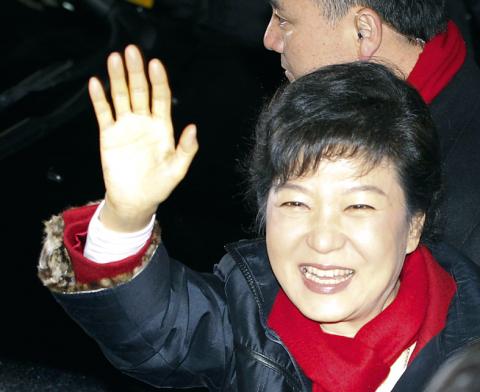The daughter of a former military ruler took a commanding lead in South Korea’s presidential election yesterday, putting her on track to become the nation’s first female head of state.
A win for 60-year-old conservative Park Geun-hye would see her return to the presidential palace where she served as her father’s first lady in the 1970s, after Park’s mother was assassinated by a North Korean-backed gunman.
With more than 70 percent of the votes counted, Park led with 51.6 percent to 48 percent for her left-wing challenger, human rights lawyer Moon Jae-in.

Photo: Reuters
Her raucous, jubilant supporters braved sub-zero temperatures to chant her name and wave South Korean flags outside her house.
An elated Park reached into the crowd to grasp hands.
Park will take office for a mandatory single, five-year term in February and will face an immediate challenge from a hostile North Korea and have to deal with an economy in which annual growth rates have fallen to about 2 percent from an average of 5.5 percent in the past 50 years.
She is unmarried and has no children, saying that her life will be devoted to her country.
The legacy of her father, Park Chung-hee, who ruled for 18 years and transformed the country from the ruins of the 1950-1953 Korean War into an industrial power-house still divides Koreans.
For many conservatives, he is South Korea’s greatest president and the election of his daughter would vindicate his rule. His opponents dub him a “dictator” who trampled on human rights and stifled dissent.
“I trust her. She will save our country,” Park Hye-sook, 67, who voted in an affluent Seoul district, said earlier in the day.
“Her father ... rescued the country,” said the housewife and grandmother, who is no relation to the candidate.
For younger people, the main concern is the economy and the creation of well-paid jobs in a country where income inequalities have grown in recent years.
“Now a McDonald’s hamburger is over 5,000 Korean won [US$4.66] so you can’t buy a McDonald’s burger with your hourly pay. Life is hard already for our two-member family, but if there were kids, it would be much tougher,” said Cho Hae-ran, 41, who is married and works at a trading company.
Park Geun-hye has spent 15 years in politics as a leading legislator in the ruling Saenuri Party, although her policies are sketchy.
She has a “Happiness Promotion Committee” and her campaign was launched as a “National Happiness Campaign,” a slogan she has since changed to “A Prepared Woman President.”
She has cited former British prime minister Margaret Thatcher, a tough proponent of free markets, as her role model as well as German Chancellor Angela Merkel, Europe’s most powerful leader.
One of those who voted yesterday was Shin Dong-hyuk, a defector from North Korea who is the only person known to have escaped from a labor camp there.
He Tweeted that he was voting “for the first time in my life,” although he did not say for whom.
Park Geun-hye has said she would negotiate with Kim Jong-un, the youthful leader of North Korea who recently celebrated a year in office, but wants the South’s isolated and impoverished neighbor to give up its nuclear weapons program as a precondition for aid, something Pyongyang has refused to do.

SECURITY: As China is ‘reshaping’ Hong Kong’s population, Taiwan must raise the eligibility threshold for applications from Hong Kongers, Chiu Chui-cheng said When Hong Kong and Macau citizens apply for residency in Taiwan, it would be under a new category that includes a “national security observation period,” Mainland Affairs Council (MAC) Minister Chiu Chui-cheng (邱垂正) said yesterday. President William Lai (賴清德) on March 13 announced 17 strategies to counter China’s aggression toward Taiwan, including incorporating national security considerations into the review process for residency applications from Hong Kong and Macau citizens. The situation in Hong Kong is constantly changing, Chiu said to media yesterday on the sidelines of the Taipei Technology Run hosted by the Taipei Neihu Technology Park Development Association. With

CARROT AND STICK: While unrelenting in its military threats, China attracted nearly 40,000 Taiwanese to over 400 business events last year Nearly 40,000 Taiwanese last year joined industry events in China, such as conferences and trade fairs, supported by the Chinese government, a study showed yesterday, as Beijing ramps up a charm offensive toward Taipei alongside military pressure. China has long taken a carrot-and-stick approach to Taiwan, threatening it with the prospect of military action while reaching out to those it believes are amenable to Beijing’s point of view. Taiwanese security officials are wary of what they see as Beijing’s influence campaigns to sway public opinion after Taipei and Beijing gradually resumed travel links halted by the COVID-19 pandemic, but the scale of

A US Marine Corps regiment equipped with Naval Strike Missiles (NSM) is set to participate in the upcoming Balikatan 25 exercise in the Luzon Strait, marking the system’s first-ever deployment in the Philippines. US and Philippine officials have separately confirmed that the Navy Marine Expeditionary Ship Interdiction System (NMESIS) — the mobile launch platform for the Naval Strike Missile — would take part in the joint exercise. The missiles are being deployed to “a strategic first island chain chokepoint” in the waters between Taiwan proper and the Philippines, US-based Naval News reported. “The Luzon Strait and Bashi Channel represent a critical access

Pope Francis is be laid to rest on Saturday after lying in state for three days in St Peter’s Basilica, where the faithful are expected to flock to pay their respects to history’s first Latin American pontiff. The cardinals met yesterday in the Vatican’s synod hall to chart the next steps before a conclave begins to choose Francis’ successor, as condolences poured in from around the world. According to current norms, the conclave must begin between May 5 and 10. The cardinals set the funeral for Saturday at 10am in St Peter’s Square, to be celebrated by the dean of the College